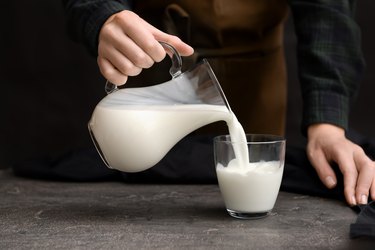
You've likely heard that milk and stomach acid are enemies. When your body produces too much stomach acid, the acid may enter your esophagus, and you may experience ulcers or heartburn. If these conditions happen too often, your health may decline dramatically.
People often drink milk to provide relief for heartburn and decrease stomach acid production. While this practice may temporarily decrease stomach acid, it does not treat the underlying cause of the acid reflux. And drinking full-fat milk products can actually make symptoms worse. See a doctor for an evaluation if you have recurring heartburn.
Video of the Day
Video of the Day
Tip
Drinking low-fat or fat-free milk can temporarily decrease stomach acid production. Avoid full-fat milk — these products stay in the stomach longer, which can increase acid levels.
Read more: The 10 Worst Foods for Acid Reflux
Understand Milk and Stomach Acid
Skim milk and reduced-fat milk are the best dairy options if you have recurring heartburn. Low-fat or fat-free milk and other dairy products can help sooth symptoms of excess stomach acid production, according to Cleveland Clinic.
Avoid the full-fat versions of these foods — fat takes longer to leave the stomach, which can increase acid production.
Make Lifestyle Changes
While a few sips of milk may help control symptoms caused by excess stomach acid, other changes to your diet and lifestyle may help even more. Lifestyle changes can reduce symptoms caused by excess stomach acid production.
Lifestyle changes to consider include reaching or maintaining a healthy weight, staying upright for 30 minutes after eating, wearing looser clothes, avoiding tobacco use, elevating the head of your bed by 6 inches and practicing relaxation techniques to decrease your stress levels, according to the U.S. National Library of Medicine.
Try Acid Reflux Diet Changes
Acid reflux diet changes that help to minimize stomach acid production include eating smaller meals, avoiding chewing gum and limiting your consumption of hard candy. Certain foods can increase acid production or relax the lower part of your esophagus, contributing to reflux.
According to UNC REX Healthcare, these foods and beverages can include fatty foods, tomato sauce, garlic, citrus fruits, peppermint, oils, creamed soups, fast foods, carbonated soft drinks, fried foods, spicy foods, onions, chocolate, alcohol or caffeine. As they may trigger your excess stomach acid symptoms, avoid them as much as possible.
On the other hand, certain foods can be beneficial for this condition. Foods and drinks that help acid reflux can include lean proteins such as chicken, mild green vegetables, brown rice, melon, oatmeal, fennel and ginger, according to University Hospitals.
Read more: Foods for Children With Acid Reflux
See a Doctor
Although excess stomach acid production doesn't usually lead to a serious medical condition, left untreated, it can damage your esophagus, stomach or intestines. Over-the-counter medications can be helpful for occasional heartburn. In some cases, however, prescription medications that block acid production might be needed.
If after making diet and lifestyle changes, you still have heartburn more often than twice per week, problems swallowing, persistent nausea or vomiting, or weight loss due to poor appetite, see a doctor, as advised by the Mayo Clinic.